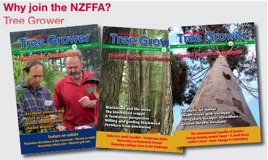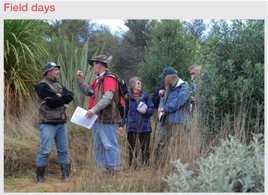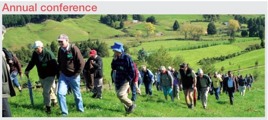New possible structures and representation
Howard Moore, New Zealand Tree Grower November 2019.
This article is part of a presentation made at the NZFFA conference in Rotorua in May this year.
There is a general feeling that we, and all other owners of small forests should be better represented.
- We are a valuable part of the economy and the country needs our forests to protect water and soils, store carbon, and provide jobs, timber and exports
- Local and central government seem to impose regulations on us with little thought or concern for the effects of their changes
- To protect our interests we need informed, articulate people to argue the point and make them aware of reality from our point of view.
- To involve and support those champions we need money and an organisation structure which allows us to make quick decisions. What form should it take? How will we fund it?
Let us slow down a little.
Who are ‘we’?
Forestry is the main business of only one per cent of the known 14,500 forest growers in New Zealand. The rest of us owners of small forests almost by definition do not have forestry as our main livelihood. ‘We’ are generally farmers, investors or lifestyle block owners with other income and interests. Of course, our forests are important, but in truth they are mostly secondary to us and certainly everyone else. We get hot when someone challenges our main interests – families, farms and capital gains – but we are slower to get passionate about challenges to our secondary interests. After all, we are not committed to them. They are not a life-and-death choice, they are a lifestyle choice.
Certainly, our forests are a valuable part of the economy. We get regulations imposed on us with seemingly little thought, and the agencies to blame should be more aware of reality on the ground. But they are not. It is easy to assume it is a result of ignorance or conspiracy, but perhaps it is neither.
Like us, the agencies which make life difficult are focussed on their core businesses. When their changes affect owners of small forests it is not because they think about us − we simply become collateral damage in a larger initiative. Perhaps they know but do not care, or believe it does not matter. If we protest, they will listen and sympathise and might try to mitigate the damage, but they will not reverse what they are trying to do. As far as they are concerned the Emissions Trading Scheme, or targeted rate or Billion Trees programme solves one of their large, pressing problems and our lifestyle choice is incidental.
If, as I believe, we are dealing with agencies which are preoccupied we need to temper our approach. Of course, we still need to involve and support our champions, but they need to be informed, articulate people who educate and persuade rather than argue the point. We need them to understand balance and fairness, not boldness and force. We need them to be available rather than indomitable.
What we do now
This implies a somewhat nuanced support structure. If our champions are not going to behave like attack dogs, they can run loose. If we trust them to educate and persuade, we do not need to monitor everything they say and do. If they are available and understand balance and fairness, they can be autonomous. Their support structure can be lighter and the decision-making process less immediate. Delegation of authority, responsibility and accountability might be offered with trust. Do you recognise this? Broadly speaking, it is what we do now.
The ‘light hand’ approach has several implications.
- It positions the NZFFA as a political moderate. Organisations whose members derive their entire livelihood from forestry might be more right-wing and outspoken, such as the NZ Forest Owners’ Association and some Māori organisations. Our views and theirs might not always align, which could limit the extent of any closer working relationships. Organisations whose members derive no livelihood from forestry might be more socialist and outspoken, such as Forest and Bird and the Environmental Defence Society. Again, our views and theirs might not always align.
- The NZFFA can promote itself as the defender of forestry-related values for those who grow trees as a secondary interest. It would be easy to say to land owners ‘You understand your business, come to us if you want help with your trees.’ Such a frank message might appeal to any number of land owners thinking about trees but not sure how much they do not know.
- The concept of being the defender of forestry-related values for those who grow trees as a secondary interest is built into our name, the NZ Farm Forestry Association. Given that, it would seem counterproductive to change it and rebrand the NZFFA.
- As long as our informed, articulate champions are available, they do not need to be full time employees. They can be contractors or volunteers. They do need to be managed, encouraged and rewarded or else delegation will fail but it is moot whether management should be by using a full-time paid manager, or through the Executive.
Avoiding collateral damage
Of course, our general feeling that the interests of small forest owners are being ignored casts a wide shadow. It extends beyond local and central government to other industry bodies – for example the Forest Growers’ Levy Trust, Scion, forestry contractors and even the wider public who at the extremes either hate trees, or hate anyone who tries to cut one down. These groups all have different interests, but they all focus on one thing − people who make money from forests.
Most of the time it is not us, it is those with forestry as their main business. Like government agencies, these industry bodies are trying to achieve their own aims and objectives, and when their changes affect owners of small forests it may not be because they think of us. Again, we might be collateral damage. Should we protest, they might listen and sympathise and try to mitigate the damage, but they are unlikely to reverse what they are trying to do. As far as they are concerned it is imperative they act on tree breeding, or bigger machinery or water rights. Again, our lifestyle choice is incidental.
E α mC2
Accepting the fact that our forests are important but mostly secondary to us, and certainly to everyone else, we have evolved a structure which allows us recognise and deal with it. Others spend time and money on fast cars, rental properties, travel or personal grooming. We have chosen to spend time and money on trees. It is more environmentally friendly than fast cars and personal grooming but until people start thinking like us we are a little alone on the moral high ground. Rather than point out to others the error of their ways, we need a message that encourages them to join us.
Long ago I went to a conference where a speaker said ‘The audience will not believe you are an expert unless you have an equation.’ I took that on board and ever since I have tried to use a simple equation like the one made famous by Albert Einstein, E = mC2. Of course, he was not thinking of forestry so it needs to be modified a bit for this occasion.
Let us change it to E α mC2 where α is the standard mathematical symbol for ‘is proportional to.’ Then if we define E as effectiveness, m as message, and C as cash, the equation says −
The effectiveness of any message is proportional to the square of the money you throw at it.
It has an appealing sort of Colmar Brunton ring.
The message I proposed earlier was, ‘You understand your business, come to us if you want help with your trees.’ As a marketing slogan it implies lifestyle choice and leadership. It is inclusive, non-threatening and has useful environmental overtones. It is appropriate for the structure we have evolved, which reflects our tacit understanding of who we are. By all means, let us get more money. Certainly, let us spend it on representing our point of view. Let us also promote who we are, what we stand for and why. All of our values are sound. We just need more friends on the moral high ground.
The illustrations which accompanied this paper at the conference have been removed to ensure that those who attended received a little more value than those who did not. Information always costs somebody something. It may be donated, but it is never free.

 Farm Forestry New Zealand
Farm Forestry New Zealand

